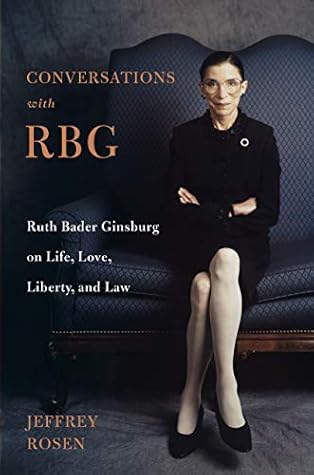More on this book
Community
Kindle Notes & Highlights
Read between
September 18 - September 25, 2020
“When fathers take equal responsibility for the care of their children, that’s when women will be truly liberated.”
· Flag
Amanda Campbell
sometimes one must be forceful about saying how wrong the Court’s decision is.
“He was the only guy I ever dated who cared whether I had a brain,”
If an unkind word is said, you just tune out.
emotions like anger, remorse, and jealousy are not productive. They will not accomplish anything, so you must keep them under control.
In my entering class at Harvard, there were nine women and over five hundred men.
Roe v. Wade, in its time, was not all that controversial. It was a seven-to-two decision, only two dissenters.
the images of the doctor and the little woman—it’s never the woman alone. It’s always the woman in consultation with her doctor. My idea of how choice should have developed was not a privacy notion, not a doctor’s right notion, but a woman’s right to control her own destiny, to be able to make choices without a Big Brother state telling her what she can and cannot do.
if Roe is overruled, there’s no woman of means who could not get a safe abortion someplace in the United States. There will be a core of states that will never go back to the days of unsafe, back alley abortions. So, poor women have no choice, women of means will be able to decide for themselves.
if we don’t protect the people we don’t like, we’re going to lose protections for ourselves. The Fourth Amendment doesn’t say you can search the bad guys but not the good guys.
Imagine this Constitution from 1787, it is still governing us.
Throwing out preclearance when it has worked and is continuing to work to stop discriminatory changes is like throwing away your umbrella in a rainstorm because you are not getting wet,”
Ginsburg “allows women to imagine a different kind of power and to visualize a woman in power well past an age where she is usually invisible to society.”
“Dissents speak to a future age,”
“We have the right to swing our arm until it hits the other fellow’s nose.”
I think it’s good when we look back to see that there were people who thought the Court’s judgment was wrong and wrote the judgment that was right—it starts out as a dissent and then, in the next generations, becomes the opinion of the Court.
I think it is most unfortunate that the people who are disadvantaged are the most voiceless people, poor women.
Most countries in the world, most industrialized countries, have universal health care. They had Social Security long before we did. So I saw the health care act as just completing that flaw, that safety net—people will have Social Security coverage when they’re elderly or when a partner dies, and health care should be part of that same understanding, that government does have an obligation to see that people’s basic needs are met.
I thought once the Social Security Act was accepted, there would be no question anymore about the Commerce Clause extending to health care.
we will get back to where we were ever since the late thirties, when economic and social legislation is recognized as the proper domain of the Congress, and that, as devoted as you may be to your particular state, there are so many things in this highly industrialized world that states can’t do, that have to have a national solution.
“In most of the post-1970 gender-classification cases, unlike Roe, the Court … approved the direction of change through a temperate brand of decision-making, one that was not extravagant or divisive. Roe, on the other hand, halted a political process that was moving in a reform direction and thereby, I believe, prolonged divisiveness and deferred stable settlement of the issue.”1
The great irony of the debate about special treatment versus equal treatment for women, as Ginsburg noted, is that the “separate modes thesis” of the new legal feminists looks very much like “the old typology in which the female is classified in terms of passion and its bonds, the male in terms of reason and its distinctions.”
“I am fearful, or suspicious, of generalizations about the way women or men are,”
“My dream for my children and their children,” she said in 1984, “is of men and women who, in combination, forge new, shared patterns of career and parenthood, and strive to create a society that facilitates those patterns.”
my plan would give men encouragement and incentives to share more evenly with women the joys, responsibilities, worries, upsets, and sometimes tedium of raising children from infancy to adulthood.
If you have a dream, something you want to pursue, and you’re willing to do the work that’s necessary to make the dream come true, don’t let anyone tell you, you can’t do it.
if the spirit of liberty dies in the hearts of the people, no court is capable of restoring it.
the government is not providing equal protection when Medicaid covers, say, childbirth but not abortion or contraception services.
Many states will never go back to the way it was. And then it will become even more pronounced, to put it bluntly: poor women must breed, affluent women can choose.
As bad as things may be, they are better than they once were. These are not the best of times, but think of how many bad times I’ve experienced in my long life. Starting with the Second World War, overwhelming when I was growing up. Then Senator Joe McCarthy when I was in college. Then Vietnam. Somehow, we have gotten over the worst of times.
Are you concerned that we’re seeing the rise of the kind of demagogues the Founders feared? RBG: Yes.


